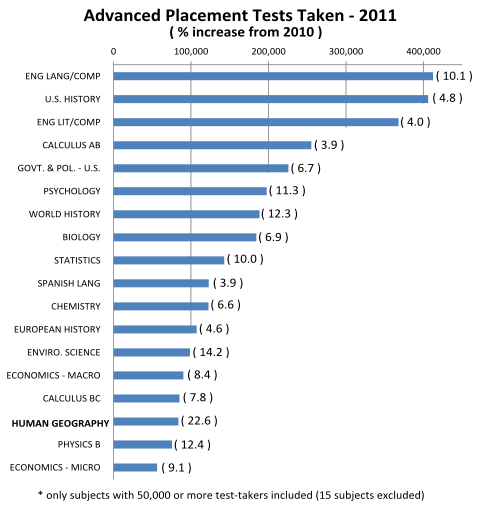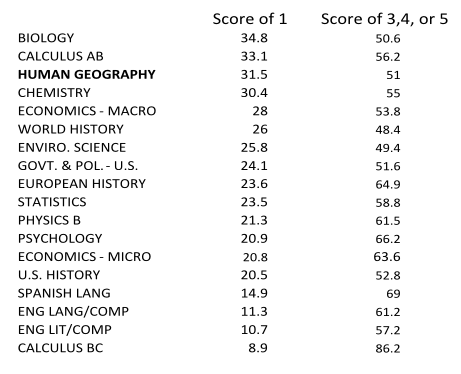Among America’s Best & Brightest, Geography Casts But a Faint Glow
by Brian Timoney
Proust had his madeleine, the rest of us have our parents’ basements and attics with the bric-a-brac that promises emotional transport to a different time and place. During my last visit home, I came across my grandmother’s diploma circa 1914: a fascinating document from an era where a couple years of high school was the terminus for her social class and a quite adequate preparation for being a seamstress, clerk, or housewife (the professions of her and her sisters). Most interesting, the diploma listed the courses she took: catching my professional eye were entries for both Physical Geography and Political Geography.
In other words, two more geography courses than her grandson took in his “college prep” curriculum seventy years later.
Being curious as to what the kids are up to today, I delved into the Advanced Placement (AP) test data for 2011 to find out “whither Geography among our best and brightest?” While the rigorous International Baccalaureate curriculum has gained traction in recent years, AP courses are more numerous and their test scores, which can command college credit, provide a hefty sample size from which to draw conclusions.
The good news? Among subjects with more than 50,000 test-takers, Human Geography had the largest year-over-year increase with a healthy 22.6% bump to almost 84,000 students undergoing the 2-hour ordeal.
The bad news? More than twice as many young American minds sat for the AP Psychology test.
(Editor’s note: pondering for more than 30 seconds what may lurk inside a high school Psychology text book plunges the author into existential despair.)
But that’s not the worst news. Because on a scale of one to five, over 31% of those taking the exam scored a “1” i.e. utter failure. Adding to the ignominy, a bare majority of 51% scored a passing grade of 3, 4, or 5.
Taking a closer look at the scores and their distributions, one can make the broad claim that results in the social sciences are fairly mediocre. To be sure there is a selection bias at work as well: completing the coursework for Calculus BC implies mastery of the material in Calculus AB, and the scores reflect that very few bumble through that progression. (Full disclosure: I was one of those bumblers racking up a “2” in AP Biology many moons ago.)
Cause for hand-wringing despair? Maybe not. More plausible to me is the suspicion that for those taking AP Human Geography as a junior or senior in high school, it’s most likely their first exposure to thinking geographically in any kind of a structured manner. If anything, it’s a call for more rigorous geography at all grade levels as analyzing one’s place in the world and the interrelationships with those near and far is too important to leave to a cram course at the end of high school.
Add that to the wisdom lost from back in Grandmom’s day that we so need to recover, 100 years later.
—Brian Timoney

